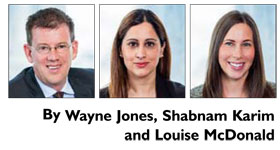 Due to the increasing population and increased awareness of health matters, the number of complaints and claims against healthcare providers and physicians has resulted in an upward trend of medical malpractice litigation. Medical malpractice litigation in the Kingdom of Saudi Arabia: Saudi Arabia’s legal system is based on the principles of Islamic (Shariá) law that are, in general, applied in a more conservative and strict manner than other countries within the Middle East. There is no doctrine of binding precedent, nor comprehensive reporting of cases as would be the case in common law jurisdictions. Higher court decisions in Saudi Arabia and other Middle Eastern countries are persuasive, but not binding (in contrast to others such as England). A specialist forum, the Insurance Committee, was established in 2007 for the resolution of any insurance disputes on coverage matters. Pursuant to the Law of Practicing Healthcare Professions, a specialist panel, the Sharia Medical Panel, was established to consider claims in respect of medical malpractice. Cases in Saudi Arabia are ordinarily heard before a judge and there are no jury trials in Saudi Arabia, but the Sharia Medical Panel is made up of legal and medical experts. Litigation culture in the Kingdom of Saudi Arabia and the approach to damages awards: As a general proposition, Saudi Arabia is not as litigious as more developed jurisdictions, such as the UK or USA. There has, however, been a noticeable increase in the tendency to resort to litigation. The tendency with damages awards has been for the courts not to award significant (by western standards) awards over and above the statutory Diyah and indemnity levels. Diyah is the remedy prescribed for wrongful death; Arsh is compensation prescribed for loss of an organ or bodily injury. Diyah payment is presently set by statute and the maximum is SAR300,000. Arsh is similarly payable based on injury to or the loss of a specific body part which depends on the seriousness of the loss/injury up to a maximum which is below the level of Diyah. The current blood money amount is SAR300,000 (US$80,000) for a male Muslim, though this may be doubled during the pilgrimage (hajj). The limit for female Muslims is 50 percent of this figure, and persons of all other religions: 25 percent. We set out below a few examples of awards which have been made publically available: Standard of care: Under the Law of Practicing Healthcare Professions, a healthcare professional is obliged to “exert due care in line with commonly established professional standards”. This is therefore an objective standard. Criminal liability: The law also sets out the fines and punishment in respect of criminal liability. A healthcare professional can be subject to imprisonment (not exceeding six months) and/or a fine not exceeding SAR100,000 for breaches of the law including: Disciplinary liability: Any healthcare professional who defaults in performing any duty provided for in the Law of Practicing Healthcare Professions, violates any codes of practice or acts contrary to professional conduct or ethics shall be subject to disciplinary actions, which can include a warning, a fine (not exceeding SAR10,000) and revocation of their licence. Summary: In general, the lack of certainty regarding damages means the litigation risk is significantly higher in Saudi Arabia compared with other jurisdictions. In comparison, however, the level of damages awards remains much lower than in those jurisdictions which means the uncertainties will affect both parties. |
Abdulaziz A. Al-Bosaily Law Office
in association with Clyde & Co LLP
Tel: (966) 11 200 8817
Fax: (966) 11 200 8558
Email: wayne.jones@clydeco.com
shabnam.karim@clydeco.com
louise.mcdonald@clydeco.ae
Website: www.clydeco.com

